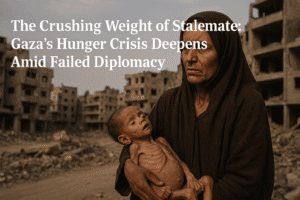The Crushing Weight of Stalemate: Gaza’s Hunger Crisis Deepens Amid Failed Diplomacy
Gaza’s deepening catastrophe sees at least 57 killed in 24 hours—including infants dying of starvation and civilians shot while awaiting food aid—as ceasefire talks collapse. Israel’s withdrawal from negotiations and Netanyahu’s ominous “alternative options” signal escalating danger amid a man-made famine.
Over 90,000 malnourished women and children now urgently need treatment, with UN agencies confirming Israel systematically blocks aid distribution. Starvation has become a weapon: families like Rania al-Sharahi’s, surviving on scraps after losing 22kg while pregnant, embody the UN’s warning that airdrops cannot reverse systemic collapse.
Global tensions flare as France pledges recognition of Palestine while Italy and the UK hesitate, exposing fragmented international responsibility. With 124 starvation deaths officially recorded and nearly 60,000 total killed, the world witnesses a historic humanitarian implosion where political deadlock literally starves civilians. This is not collateral damage—it is policy failure written in emaciated bodies and empty bread baskets.

As ceasefire talks collapse, civilians pay the ultimate price for political deadlock
The Unfolding Catastrophe
In the past 24 hours, Gaza witnessed 57 more lives erased – not only by airstrikes but by starvation and desperation. Among them: three infants dead from malnutrition, and Palestinians shot while waiting for food near aid crossings. This grim reality underscores a terrifying truth: hunger has become as lethal as bombardment in this shattered enclave.
Why Diplomacy Failed
The collapse of Doha talks reveals fundamental fractures:
- The Stationing Stalemate: Hamas and Israel remain irreconcilably divided over Israeli troop positions during any ceasefire
- Humanitarian Blackmail: Aid access and prisoner exchanges are being weaponized in negotiations
- The Blame Game: While the U.S. and Israel accuse Hamas of bad faith, mediators Egypt and Qatar hint talks could resume – suggesting withdrawal may be tactical brinkmanship
The Anatomy of Starvation
Behind the statistics lie unbearable human experiences:
- Rania al-Sharahi (44, pregnant) has lost 22kg while watching her children scavenge for scraps
- 90,000+ women and children urgently need malnutrition treatment
- Aid trucks now deliver just 14% of pre-war volumes despite Israel’s claims of “sufficient aid”
- UN officials call airdrops “distractions” that won’t reverse systemic starvation
Global Reckoning
International responses reveal shifting alliances:
- France will recognize Palestine at the UN General Assembly in September, framing it as moral condemnation
- Italy counters that premature recognition is “counterproductive”
- UK’s Starmer faces domestic pressure to follow France’s lead while scrambling to deliver aid
- Jordan resumes high-risk airdrops – a tacit admission ground aid has failed
The War of Narratives
Israel dismisses starvation reports as “media campaigns,” while the UN details how:
- 70% of aid distribution requests are denied or delayed by Israeli authorities
- Security concerns are weaponized to throttle humanitarian operations
- The “4,500 trucks” figure since May equals one truck per 5,000 Gazans daily
The Human Dimension
Rania al-Sharahi’s words crystallize the crisis: “Our tears have dried from crying so much… Bread is a luxury. I dream of anything sugary for energy.” When infants perish from hunger and parents avoid aid lines fearing death, survival itself becomes political resistance.
What Comes Next?
Netanyahu’s “alternative options” loom ominously as:
- Civilian deaths near 60,000
- Starvation deaths officially reach 124 (including 84 children)
- Diplomacy remains gridlocked over irreconcilable demands
The tragedy extends beyond bombs and bullets. It’s in the emaciated child too weak to cry, the parent choosing between starvation and sniper fire, and the international community’s fragmented conscience. Until leaders prioritize human survival over tactical victories, Gaza’s descent into famine becomes an indelible stain on our collective humanity.
You must be logged in to post a comment.